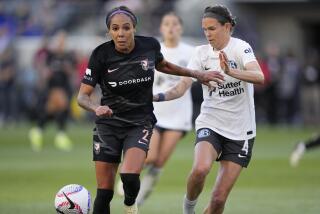Tensions Remain Despite Beach Volleyball Deal
- Share via
After settling a contract dispute with the international governing body for beach volleyball just before midnight Tuesday, American players participated in the World Championships in Berlin and caused controversial reactions among international competitors.
Players Kerri Walsh and Todd Rogers and sports agent Ryan Morgan negotiated new language in several clauses of a 14-page, four-year contract that Federation International de Volleyball requires players to sign before participating in events.
The new contract includes a new provision for the troublesome “bonus pool” of prize money but still needs official approval from FIVB President Ruben Acosta. If he does not approve, it will revert to a one-year deal.
“Getting the FIVB to budge is no small task” said Morgan, reached by phone in Berlin. “They finally started to take it serious when we said we would continue to miss events.”
The threat of not having Olympic gold medalists Walsh and Misty May in its events apparently was enough to get the FIVB to soften its hard-line stance, but the new deal sparked debate. Some international players mistakenly thought the Americans would be playing under a contract different from theirs and claimed that the Americans were getting preferential treatment.
They threatened to boycott the World Championships until FIVB officials informed them that the new contract applies to all players. They then called for the formation of a player union.
Sinjin Smith, a former standout player and current president of the FIVB Beach Volleyball World Council, wrote in an e-mail that players have long been encouraged to elect representatives that participate in FIVB policy making, but they have thus far failed to do so.
“Players from around the world feel that they aren’t represented within the FIVB structure,” Smith wrote. “It seems as if they don’t want to have to represent themselves but want to find others who aren’t players to represent them.”
Morgan explained that many of the issues, such as worldwide licensing and marketing of players and participation in non-sanctioned events, applied only to Americans who had signed AVP contracts. The new bonus pool structure would be applied across the board, Morgan said.
Players in FIVB events are paid prize money for each tournament, and then a bonus pool is allocated at the end of the season to teams that have played a required number of events. This year that quota is eight.
Because there have already been four women’s and three men’s events in 2005, FIVB officials refused to restructure the bonus pool for this year. For the next three years, however, it will be paid on a sliding scale based on the number of events played. Seven percent will be deducted for each event players fall short of the quota.
“We want to play in as many AVP and World Tour events as possible,” Walsh told Associated Press. “It’s important to play in a domestic tour for the sport’s growth at home. Traveling across to Europe back and forth is time-consuming and expensive. It’s tough for us to be at eight World Tour events.”
More to Read
Go beyond the scoreboard
Get the latest on L.A.'s teams in the daily Sports Report newsletter.
You may occasionally receive promotional content from the Los Angeles Times.







